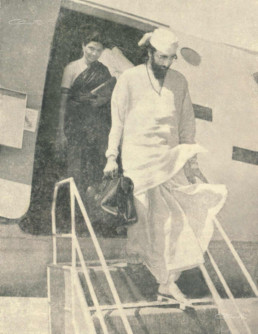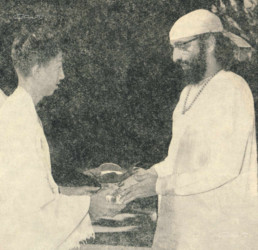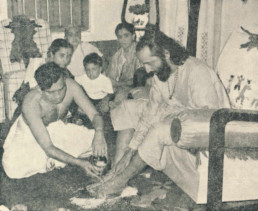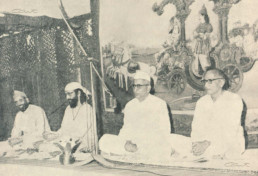
Jnana Yajna 82

Year & Dates:
March 21, 1961 to March 31, 1961

Yajna Topic:
Shrimad Bhagavad Gita- Chapter 12

Place:
Mangalore (Mangaluru), India.
Their first stop was because of curiosity. Their second exposure sparked inspired reflections, and with the third Yajna announced, they readied themselves for deeper immersion – Such was the progression in the journey of the Mangaluru audience as they awaited their third Jnana yajna and the 82nd Jnana Yajna of Pujya Gurudev.
A significant flying visit…He landed on March 21st morning after an important halt at Mumbai on completing the 81st Jnana Yajna at Kolkata. The Mumbai stopover was to oversee the sacred sankalpa of Sandeepany Sadhanalaya taking shape. The lecture hall, dining hall, kitchen, and the hostels were constructed; and, Mr. Janardhan, a devotee from Hyderabad supervising the College construction activities, was guiding the construction team to lay the foundation for Pujya Gurudev’s kutiya. Bringing with Him the energy from that devoted work in Mumbai, Pujya Gurudev had chosen chapter 12 of the Gita again – Bhakti Yoga!
Devotion and Contemplation Reinforced
Wishing for Guidance: On the evening of March 21st at 6 pm, Dr. Gollerkeri, the president of the yajna committee, welcomed Pujya Gurudev and all to the 82nd Jnana Yajna thus: “To the Mangalore public, our beloved and revered Swamiji, your name and fame have become household words, standing for all that is worth knowing in the Hindu philosophy and religion…We pray that you give us clear directions on how to build our individual and joint spiritual culture in the future when no more can we hope to jointly sit at your feet and absorb your priceless advice at close quarters.” His words echoes a widespread concern that Pujya Gurudev’s Jnana Yajnas would be suspended for a while because of His commitment to develop Sandeepany Sadhanalaya for the next few years.
The Inaugural Address: Sri B. Vaikunta Baliga, Minister Law and Labor, Mysuru, after inaugurating the Jnana Yajna, reflected: “The Gita affirms that spiritual life is essential if we have to manifest superior human virtues. If a scripture is to be useful, it must fulfill two essential conditions: (1) whether it helps man to discover himself, and realize inner peace and (2) whether it contributes to social and national harmony. The philosophy of the Gita fulfills both the conditions in an eminent way.”
The Discourses and the Audience: With a strong emphasis on the need for religion, Pujya Gurudev said that human progress had empowered a thinking individual for the next stage of evolution through contemplation. His discourses every morning on Purushottama Yoga encouraged the audience to wonder about That Transcendent Reality. Pujya Gurudev’s discourses on chapter 12, Bhakti Yoga, invoked the purifying strength of devotion and revealed the endearing beauty of surrender to the Divine Grace of Bhagavan.
As we reflect…The Vedantic Renaissance that Pujya Gurudev flagged off was steered and fanned with consistent efforts. He reignited spiritual thirst and brought out the full force of the Gita with the conviction that “repetition fosters reflection.”
Photo Gallery
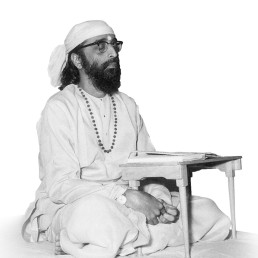
“Think,” Says Pujya Gurudev
With perfect faith: Faith is generally understood as a “blind belief”. This is not the Shraddha here meant. The term Shraddha has been beautifully described by Shri Shankaracharya as follows:-”That is called the ‘Spirit-of-faith’ by which an individual understands readily the exact import of the scriptural text as well as of the pregnant words of advice of the Preceptor- by which alone the reality of things becomes clearly manifested”. Without this faculty developed in him a devotee may not succeed sufficiently in bringing about a self-divinisation in himself even after years of practice.
Thus three main conditions are enumerated in this stanza as essential and unavoidable for one to become a true devotee. Perfect faith, ever steadfast in worship and one’s mind totally merged with the concept of the Lord are the three conditions, and if these are accomplished in anyone he is considered as the most steadfast devotee by the Lord.
From Tyagi Magazine
Prayer Room not meant for All!
Discover why the prayer room is not necessarily meant for all, according to Swami Chinmayananda. Instead, learn how to bring spirituality into your daily life and find the divine in your work, transforming your actions into worship. Explore the profound insights on integrating spirituality into your everyday tasks for inner peace and fulfillment.
